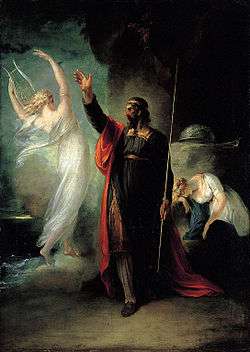Caliban upon Setebos
Caliban upon Setebos is a poem written by the British poet Robert Browning and published in his 1864 Dramatis Personae collection.[1] It deals with Caliban, a character from Shakespeare's The Tempest, and his reflections on Setebos, the brutal god he believes in. Some scholars see Browning as being of the belief that God is in the eye of the beholder, and this is emphasized by a barbaric character believing in a barbaric god.[2] An offshoot of this interpretation is the argument that Browning is applying evolutionary theory to religious development.[3] Others feel that he was satirizing theologians of his time, who attempted to understand God as a reflection of themselves; this theory is supported by the epigraph, Psalm 50:21, "Thou thoughtest that I was altogether such a one as thyself." This could be taken as God mocking Caliban (and Browning's contemporaries) for their methods of attempting to understand Him (see note at the bottom of "Caliban upon Setebos | Representative Poetry Online". rpo.library.utoronto.ca. Retrieved 2016-07-21.).
Cultural references
A short story by German writer Arno Schmidt is entitled "Caliban upon Setebos".
The poem is referred to in Dan Simmons' science fiction books Ilium and Olympos, in which Caliban and Setebos are villains.
In Jack London's novel The Sea-Wolf, Setebos is used to describe Wolf Larsen.
In the prologue to Kenneth Grahame's collection of short stories The Golden Age, "Caliban upon Setebos" is used to describe the relationship a young orphan Grahame (& his siblings) had with his guardian Uncles and Aunts, who were also referenced as the Olympians.
Excerpt
The poem begins (text in [brackets]) with a brief narration, but quickly moves to Caliban's monologue, in which he contemplates his god:
['Will sprawl, now that the heat of day is best,
Flat on his belly in the pit's much mire,
With elbows wide, fists clenched to prop his chin.
...
And talks to his own self, howe'er he please,
Touching that other, whom his dam called God.]
...
Setebos, Setebos, and Setebos!
'Thinketh, He dwelleth i' the cold o' the moon.
'Thinketh He made it, with the sun to match,
But not the stars; the stars came otherwise;
Only made clouds, winds, meteors, such as that:
Also this isle, what lives and grows thereon,
And snaky sea which rounds and ends the same.[4]— Lines 1-3, 15-16, 24-30
Citations
- Tracy, 487
- Tebbetts, 366
- Tebbetts, 367
- Browning, Robert (1897). The Poetical Works. 1. London: Smith Elder and Co. pp. 593–594.
References
- Tracy, C.R. (1938). "Caliban Upon Setebos". Studies in Philology 35 (3): 487–499.
- Tebbetts, T.L. (1984). "The Question of Satire in 'Caliban Upon Setebos". Victorian Poetry 22 (4): 365–381.
External links
| Wikisource has original text related to this article: |
